- Home
- Janelle Taylor
Can't Stop Loving You Page 6
Can't Stop Loving You Read online
Page 6
What would capture his interest?
“A new life,” he said aloud, clicking off the television and tossing the remote onto the couch. That would do it. If he could move someplace, start over, find something he loved—somebody he loved—he would be at peace.
Okay, great. Now he had a plan. All he had to do was implement it.
Yeah, right. He must have drunk that first beer down too fast. In this frame of mind, anything seemed possible.
So maybe it was, he told himself as he put on an old Steely Dan CD. Maybe all he had to do was find out what was out there, and then go after it.
He sat down at the computer desk and turned on the monitor, figuring that the Internet was a good place to start. Not that he knew how to go about finding whatever it was he was looking for. He could hardly type “new life” into the search engine Find prompt.
Or could he?
Holding the bottle in his left hand, he sipped more beer as he maneuvered the mouse with his right, using the swift one-click sign-on to the Internet.
“Welcome. You’ve got mail,” the automated voice announced.
“I do?” he said aloud. He raised an eyebrow and clicked on the mailbox icon.
He didn’t recognize the sender’s user name.
When he opened the e-mail, he automatically glanced first at the bottom for a signature.
When he read the name that was typed there, he gasped.
Instantly trembling from head to toe, he set the beer bottle on the floor beside his chair and leaned forward, forcing himself to read the message through from the beginning.
Dear Noah,
I know that this e-mail from me, out of the blue, will catch you off guard, and I’m sorry. I’ll get right to the point. The child we gave up for adoption is in trouble, and I thought you deserved to know. I’m in Strasburg, staying at the Sweet Briar Inn, in Room 8. You can reach me there. I would have called you, but there was no phone number listed in the alumni database.
Sincerely, Mariel Rowan
A flurry of thoughts crossed his mind as he finished reading—disparate thoughts, as he struggled to get hold of himself in response to the shocking, sudden connection to a woman he had never thought he would speak to—or see—again.
I never should have listened to Kelly…She had told him never to give out their phone number for anything, ever. They were unlisted, and she didn’t want to end up getting telemarketing calls. Nor did he, but that was beside the point. If he had listed their phone number on the form the alumni council had sent him years ago, Mariel could have called him directly instead of resorting to electronic communication.
Our child is in trouble.
What kind of trouble? His heart lurched at the thought of the daughter he had never forgotten, not for one day of his life in all the years since he had silently told her good-bye and wished her a good life.
She signed it Mariel Rowan—that means she’s still single.
Or did it? Mariel wasn’t the kind of woman he could imagine taking her husband’s name. He wasn’t even sure he could imagine her married. Or maybe that was just because he was reluctant to think of her with another man, even now.
Over the years, he had occasionally wondered what had become of her.
Occasionally?
Hell, often, before and after the few good years he had spent at the beginning of his relationship with Kelly.
Now he could pick up the phone and call Mariel Rowan at the Sweet Briar Inn in Strasburg. She was there, only a few hours’ drive away from here.
Because their child was in trouble.
Why the hell did she know about this? Why was she telling him? Had she been in contact with their daughter over the years?
A wave of jealousy swept through him, trailed by a flicker of long-dormant anger as all the old feelings came rushing back. He had wanted so desperately to keep their baby. Even after he had realized that she really wasn’t going to give in and marry him—even after he had realized that it was probably for the best—he had struggled to figure out a way that he could raise their daughter on his own.
But in the end, he had realized that Mariel was right. There was nothing to do but give her up to parents who couldn’t possibly love her any more than Noah did, but who would give her everything he couldn’t.
Yet they hadn’t kept his baby safe from harm. Dammit, she was in trouble.
What kind of trouble? Frantic, he rose from his chair and stalked over to the telephone, picking it up.
There was no dial tone.
Cursing, he jabbed the Talk button a few times.
Still no dial tone.
What the…?
Oh.
The line was tied up by the computer. He strode back over to the screen and quickly signed off, then pressed the Talk button again.
This time there was a dial tone.
He dialed information, his heart racing.
Susan Tominski was behind the desk in the lobby when Mariel returned at dusk from an evening walk around campus. After a day spent mostly brooding in her room and scanning today’s editions of all the local papers, she had decided that it would be a good idea to get out for some air. So, despite the heat and humidity that had set in today just as Susan had forecast, she had wandered along the paths, staring at the familiar ivycovered brick buildings with their freshly painted trim and white six-over-six windowpanes.
A lifetime had passed since she had been here, and she felt the years. She barely remembered what it had been like to live in Canterbury Hall, the freshman girls’ dorm, and she didn’t recall what kinds of meals had been served in the dining hall, or whether she had ever gone to a soccer game out on the athletic field.
For all her vivid memories of what had come after—those horrid, lonely months in the Syracuse home for unwed mothers—her days here at Strasburg seemed to have faded into a series of hazy images. Except for the memories involving Noah.
Those were still vivid.
But those, she pushed away—even as she wondered if he had gotten her e-mail yet. What if he was away? Or what if he was one of those people who never checked it? Or what if he had changed his e-mail address and had never received it in the first place?
Her fears were instantly forgotten when she stepped into the lobby and Susan stopped her and handed her a folded sheet of paper. “Somebody called for you while you were out, Ms. Rowan,” she said. “I rang him through to your room, but I’m afraid we don’t have one of those voice mail systems like newer hotels. He called me back at the desk when he didn’t reach you, and he left his number.”
He.
So it had been Noah.
But of course it had been.
Who else knew she was here? Leslie and her father had only the number for the Super 8 where she had initially made her reservation, and she couldn’t bring herself to call them today and tell them she had changed her plans. She was afraid they would hear in her voice that she was troubled, and she couldn’t begin to explain what was wrong.
With trembling fingers, she unfolded the paper and saw Noah’s name, alongside a telephone number with a 212 area code.
“Thank you,” she said to Susan, turning toward the stairway.
Safely in her room, with its cheery navy-on-white floral-print wallpaper, she sat on the edge of the bed and dialed Noah’s number.
She took a deep breath as it rang, her mind racing as she tried to brace herself to hear his voice again after all these years.
When it happened—when she heard his voice at last—it was an answering machine’s recorded outgoing message. Even then, it had an impact on her.
“We can’t come to the phone right now. Please leave a message at the beep and we’ll get back to you.”
We.
So he didn’t live alone.
Well, what did she expect? He was probably married with several children by now.
She hung up at the beep, unable to find her voice, too shaken by the haunting sound of his.
She coul
d try him back later.
But when she did—a half hour later, and every fifteen minutes after that—she got only the machine. Each time, she hung up. If she left a message, the ball would be in his court again. If he didn’t call back, she would be helpless, left to wait until she heard from him. She was much better off trying until she got a human voice—preferably Noah’s—on the line.
She shuddered at the likelihood that the phone might be answered instead by his wife or one of his children. What would she say if she found herself speaking to the woman he had married? How would she introduce herself? As an old friend?
But maybe she wouldn’t have to. Maybe Noah had already told his wife about the e-mail. Maybe he had long ago told her about his old girlfriend Mariel. Or maybe Mariel hadn’t been a significant enough part of his life to warrant mention. Maybe he had never thought about her at all.
No. She couldn’t believe that. However Noah had felt about her in the end, he couldn’t have forgotten her. What they had been through together was too heartwrenching to simply get past and move on. Surely he had thought about their child over the years. Surely he had thought about her.
But surely not as often—or as wistfully—as she had thought about him.
Finally, well after midnight, she gave up trying to call him. It was too late now. Maybe he and his wife were out on the town, or had gone away for the weekend. Maybe he had checked his e-mail from another location. Maybe he was a traveling businessman with a laptop and a summer house in the Hamptons.
It seemed strange, now, that she had no idea what his life was like or who he had become.
Mariel paced restlessly across the light blue carpet and looked out the window at the silent, empty stretch of Main Street below. The window was open, but there was no breeze to stir the starched white priscilla curtains. The sound of crickets drifted up to her ears, and, from one of the college hangouts up the block, she could hear the faint music of a live band.
Stretching and rubbing her aching neck muscles, she decided she might as well go to bed. She was physically exhausted, though she doubted she would get much sleep this evening now that Noah had called.
She hadn’t slept last night, either, when she had finally crawled beneath the crisp white coverlet—her thoughts had whirled with concerns about Amber, wherever she was. Every frightening movie she had ever seen had come back to haunt her, particularly movies of the week about kidnaped teenagers, and slasher movies about psychos and serial killers. She envisioned hundreds of different scenarios, all of them terrifying, all of them making her physically ache with worry.
Now she wearily changed into the sleeveless babydollstyle summer nightgown she had brought. Last night she had worn the flannel pajamas she had thrown into her suitcase as an afterthought, and it had been a good thing she had brought them. But the weather tonight was drastically different. Even this almost-sheer pale yellow cotton felt like too much fabric on a hot, sticky night like this.
Should she put on a robe before she walked down the hall to brush her teeth and wash up?
No. It was simply too hot, and even though it was a shared bath, she had it all to herself, as there were no other guests staying on the third floor. In fact, maybe she would take a shower to cool off before bed, she decided. It might help her to relax so that she could fall asleep.
Mariel picked up the small quilted floral bag containing her toiletries and headed down the hall. The inn was quiet, although she could hear faint strains of the classical music that was always playing in the lobby.
Her footsteps scarcely made a sound on the dark green carpeting as she moved along the corridor, which was dimly lit by candle-style electric sconces. The doors to the other three third-floor guest rooms were ajar, and she gave in to her curiosity and peeked into each one as she passed.
Like her room and the hallway, they were all papered in floral Waverly print—one in shades of lavender, another in yellows, and the third in reds. All the furniture was of polished cherry wood in classic Queen Anne style. Rooms 5 and 7 each had two double beds, and room 6 had a single queen-sized bed, just as Mariel’s room did.
It was in one of these four rooms that she had spent that fateful night with Noah. She was certain that they had been on the third floor, because she knew they hadn’t had a private bathroom. But which room was it? She couldn’t remember, and snooping beyond the open doors didn’t trigger anything in her mind.
At the end of the hall, she went into the bathroom and locked the door behind her. Then she took a long shower. Her mother always used to say that if you took a shower to cool off in the summer heat, you should use the hottest water you could stand. That way, you would feel cooler when you stepped out.
Her mother was right, she thought, five minutes later. She was far more comfortable as she wrapped a towel around herself after drying off. She knotted it just above her breasts and used another towel to wipe the condensation from the mirror, thinking about Sarah Rowan—about how often the wise words she had shared came to Mariel’s mind, and how unfair it was that she hadn’t had more time to do what a mother did naturally and best: guide her children.
She had died two years ago this August, and it had been almost ten years since she had been diagnosed with Alzheimer’s.
Mariel hadn’t wanted to believe the dire prognosis at first, despite the unmistakable signs that something was seriously wrong. Her usually organized mother had become increasingly forgetful, but Mariel had figured it was simply old age. After all, her parents were in their sixties by then. It was obvious that they weren’t going to be around forever, and Mariel should have been prepared. Her mother, often mistaken by strangers as her grandmother, had gone gray back when Mariel was still in high school, before Katie Beth’s mother had even celebrated her fortieth birthday.
But when Alzheimer’s struck, she refused to face it at first. Unlike Leslie and her father, who were openly devastated by the news, Mariel remained cheerful and optimistic. That was probably why it had hit her so hard later, as her mother’s condition spiraled downward. She had been vehemently opposed to institutionalizing her toward the end, until the day Sarah wandered out of the house and was nearly killed trying to cross the busy interstate that ran through Rockton.
Mariel had finally tearfully agreed with her father and Leslie that it was time their mother left the house where the four of them had lived for so many years. Sarah had lived another eighteen months in the nursing home, and Mariel had visited her there faithfully long after her mother stopped recognizing her.
That was the hardest part—seeing the blank look in those familiar green eyes as they gazed at her.
Now, Mariel gazed into the mirror and noticed how much she resembled Sarah. She had the same wide-set moss-colored eyes and the same high cheekbones, even the same freckles across her nose like a dusting of cinnamon. Her mother’s hair had been much straighter and a darker brown than Mariel’s own light brown waves, and Sarah had always worn it pulled back in a bun while Mariel usually wore hers hanging loose. But right now, it was wet from the shower and combed straight back from her forehead, and…
I look like her, Mariel realized. I look like she looked in the pictures of her when I was born.
Sarah had been several years older then than Mariel was now, at thirty-three, but the resemblance was close. Closer than Mariel had ever noticed.
A wave of homesickness washed over her. Not for the place, for Rockton—but for a time that had long-since passed and for a woman who was dead.
I want my mommy, she thought desolately, gazing at herself in the mirror, the reflection blurred by tears. I need my mommy.
But she couldn’t let herself cry, because if she did—if she let go—she might never stop. She wanted to cry not just for her own lost mother, but for the daughter she had given up, the daughter who might be in danger now. And for the love she had been denied when Noah turned his back on her.
No.
No.
She couldn’t allow herself to think of it
that way, because it simply wasn’t true. He hadn’t turned his back on her. He had been there, as much as he could be, throughout that endless winter when she lived in the home for unwed mothers. He had visited her regularly, and brought her little gifts even though he was always broke. He had gone to her prenatal checkups and held her hand through labor, and he had signed the adoption papers only for her sake—and perhaps, for their child’s.
She wanted to think that—that she hadn’t forced him into doing anything that really felt wrong for him. He must have realized, in the years that had passed, that it had been the right decision for both of them. He must have.
Hot tears flooded her eyes and spilled over, running down her cheeks. She took off the towel and wiped them away, then put on her nightgown. Already, the bathroom felt uncomfortably warm again, and she splashed cold water on her face and neck.
As she was turning off the faucet there was a knock on the door.
Startled, she called, “I’ll be right out.”
Who could it be? Maybe it was Susan. Maybe she had been in here too long or used up too much hot water, she thought—perhaps irrationally, she realized. After all, there were no other guests on the floor; the rooms had all been empty on her way to the bathroom, and there was little chance that somebody would be checking in at this hour.
Mariel quickly gathered her things and opened the bathroom door. The first thing she noticed was the welcome blast of relatively cooler, drier air as she stepped from the steamy bathroom into the hall.
The next thing she noticed was that the door to the room directly opposite the bathroom—Room 6, the one with the yellow wallpaper and the queen-sized bed—was now closed.
So somebody had checked in while she was taking a shower.
What kind of person would show up at a hotel at this time of night? Then it dawned on her that it was probably a couple looking for a place to spend the night together, just as she and Noah had done so many years ago.

 Shadowing Ivy
Shadowing Ivy Chase The Wind
Chase The Wind By Candlelight
By Candlelight Kiss of The Christmas Wind
Kiss of The Christmas Wind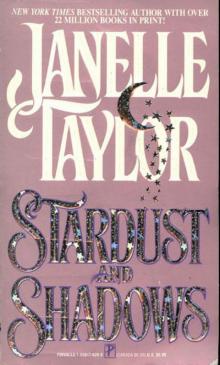 Stardust And Shadows
Stardust And Shadows Forever Ecstasy
Forever Ecstasy Destiny's Temprtress
Destiny's Temprtress Haunting Olivia
Haunting Olivia Wild Is My Love
Wild Is My Love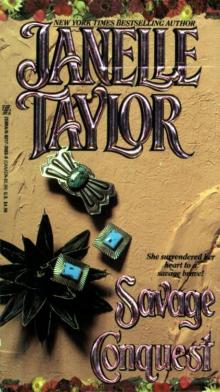 Savage Conquest
Savage Conquest Valley of Fire
Valley of Fire A Christmas Surprise
A Christmas Surprise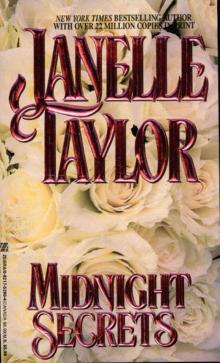 Midnight Secrets
Midnight Secrets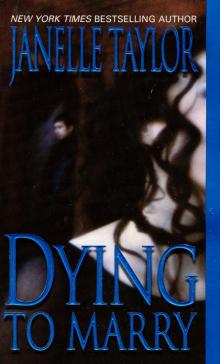 Dying To Marry
Dying To Marry Brazen Ecstasy
Brazen Ecstasy Someday Soon
Someday Soon Savage Ecstasy
Savage Ecstasy Can't Stop Loving You
Can't Stop Loving You Golden Torment
Golden Torment Forbidden Ecstasy
Forbidden Ecstasy Fortune's Flames
Fortune's Flames First Love Wild Love
First Love Wild Love Follow The Wind
Follow The Wind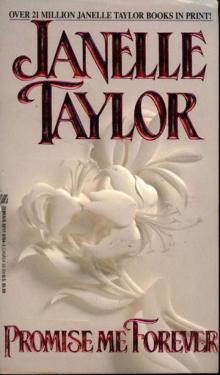 Promise Me Forever
Promise Me Forever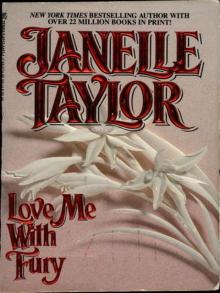 Love Me With Fury
Love Me With Fury In Too Deep
In Too Deep Lakota Winds (Zebra Historical Romance)
Lakota Winds (Zebra Historical Romance)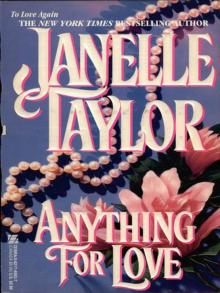 Anything For Love
Anything For Love Cherokee Storm
Cherokee Storm Straight From The Heart
Straight From The Heart Don't Go Home
Don't Go Home Wild Winds
Wild Winds Tender Ecstasy
Tender Ecstasy Defiant Ecstasy
Defiant Ecstasy Defiant Hearts
Defiant Hearts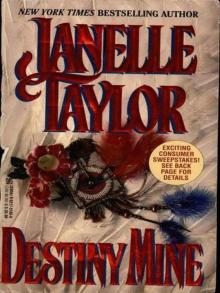 Destiny Mine
Destiny Mine Lakota Flower
Lakota Flower Passions Wild And Free
Passions Wild And Free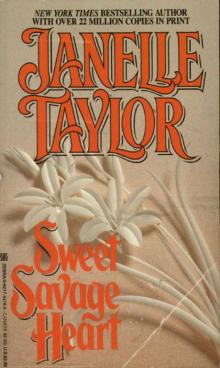 Sweet Savage Heart
Sweet Savage Heart Stolen Ecstasy
Stolen Ecstasy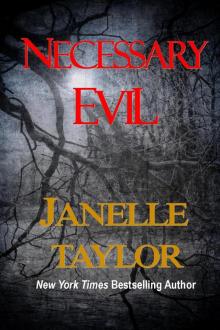 Necessary Evil
Necessary Evil Lakota Dawn
Lakota Dawn